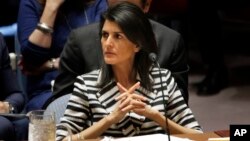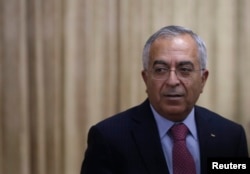The United States has objected to the appointment of a former Palestinian prime minister to lead the U.N. political mission in Libya.
U.N. Secretary-General Antonio Guterres notified the Security Council in a letter Thursday that he planned to name Western-educated economist Salam Fayyad to the position. The internationally respected Fayyad, 64, was prime minister of the Palestinian Authority from 2007 to 2013 and was also the authority's finance minister.
But U.S. Ambassador to the U.N. Nikki Haley released a statement late Friday saying the United States was "disappointed" at the choice.
"For too long the U.N. has been unfairly biased in favor of the Palestinian Authority to the detriment of our allies in Israel," Haley said in her statement. She added, "Going forward, the United States will act, not just talk, in support of our allies."
The United States is among a minority of U.N. members that do not recognize Palestine as an independent state, which has only nonmember observer status in the world body.
UN chief responds
The secretary-general’s spokesman, Stephane Dujarric, said Fayyad was chosen to lead the mission based on his experience and competence, and that U.N. personnel did not represent any government or country.
“The secretary-general reiterates his pledge to recruit qualified individuals, respecting regional diversity, and notes that among others no Israeli and no Palestinian have served in a post of high responsibility at the United Nations,” Dujarric said. “This is a situation that the secretary-general feels should be corrected, always based on personal merit and competencies of potential candidates for specific posts.”
Permanent representatives to the U.N. from France and Sweden also expressed support for Fayyad's appointment as special representative, saying they trusted Guterres' judgment on the issue.
"France reiterates its total trust to the secretary-general in identifying the personality that will represent the United Nations for Libya, a matter on which the international community needs more than ever to remain mobilized," French Permanent Representative François Delattre said.
Olof Skoog, permanent representative from Sweden, made a similar statement, saying that Fayyad "has the relevant experience and would be an excellent [representative] for the very important work relating to Libya."
In December, during the last days of the Obama administration, the U.S. chose not to veto a U.N. resolution on reining in Israeli settlement building, allowing the measure to pass. Israeli Prime Minister Benjamin Netanyahu called the U.S. abstention and the resolution itself "shameful" and said his government would ignore its provisions.
US-Israel relations
Israeli Ambassador to the U.N. Danny Danon released a statement Friday praising the Trump administration for its support of his country.
"This is the beginning of a new era at the U.N., an era where the U.S. stands firmly behind Israel against any and all attempts to harm the Jewish State," Danon said.
Trump's support for Israel, however, was thrown into question Friday after an interview with him was published in an Israeli newspaper. The U.S. president told the Israel Hayom newspaper that Israeli settlement building hurts the peace process.
"The [settlements] don't help the process," Trump said. "There is so much land left. And every time you take land for settlements, there is less land left."
Adding to the confusion, Trump told Britain's Daily Mail during his presidential campaign that Israeli settlement building should "keep moving forward."
Netanyahu is due to visit the United States on Wednesday, the same day the United Nations holds its monthly meeting on Middle East issues.
VOA's U.N. correspondent Margaret Besheer contributed to this report.










